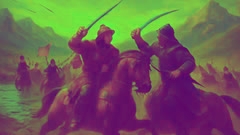Introduction
Across the wild, rolling steppes and beneath the eternal blue dome of the sky, the winds of Central Asia have long carried tales as old as the mountains themselves. Among them, none is more revered than the legend of Manas, a name whispered with awe in every Kyrgyz yurt, sung by bards around flickering hearths, and etched into the very soul of a people. The Epic of Manas is not merely a story—it is a living memory, a thunderous heartbeat that pulses through the veins of Kyrgyzstan, linking past to present, ancestor to child. In this ancient land, where the mountains wear snowy crowns and rivers cut deep into emerald valleys, the tribes once lived scattered and vulnerable, prey to marauding enemies and the bitter chill of disunity. It was an age when courage was the only coin worth trading, and when the fate of a people often rested on the resolve of a single soul. From these vast plains and shadowed gorges emerged a boy unlike any other—a child of prophecy, born beneath omens, whose cries echoed like distant thunder and whose spirit would one day unite the fractured tribes. Raised in exile, tested by hardship, Manas would journey from orphaned outcast to legendary warrior, his courage as boundless as the steppes themselves. This is the story of Manas: the founder, the unifier, and the indomitable spirit of the Kyrgyz. Through battles both savage and sublime, alliances forged in fire, and moments of heartbreak and triumph, Manas carved a path not only for himself but for his entire nation. His saga is embroidered with the threads of loyalty and betrayal, wisdom and folly, love and sacrifice. Today, as the sun sinks behind the jagged peaks and the yurts glow softly under star-strewn skies, the tale of Manas still stirs the heart—reminding all who listen that true courage can turn legend into legacy.
I. Birth Beneath the Mountains: Manas’s Prophecy
In a time before history was inked on parchment, the Kyrgyz tribes dwelled in the shadow of the Tian Shan mountains—vast, untamed, and fractured by rivalry and mistrust. Among these scattered clans lived Jakyp, a respected chieftain, and his wife Chyiyrdy, whose longing for a child seemed destined for disappointment. For years, the couple pleaded with the spirits of sky and earth for a son to carry on their bloodline and unite their people. One night, as thunder rolled over the peaks and lightning danced on the horizon, Chyiyrdy dreamt of a radiant eagle soaring over the steppes, its wings sheltering the tribes below. When she awoke, the air buzzed with portent. In due time, she gave birth to a boy whose first cry rang out clear as a battle horn, startling even the horses tethered nearby. The wise elders gathered, examining omens and runes: this child, they declared, was destined for greatness, marked by the spirits to heal divisions and drive away the darkness. They named him Manas—a name that would one day be spoken with reverence across the grasslands.

Manas’s early years unfolded beneath the ever-changing skies, where every cloud seemed to whisper tales of old. But peace never lingered for long on the steppes. Jealous rivals and ambitious khans coveted Jakyp’s growing influence. One fateful night, under a sliver of moon, traitors attacked, setting fire to the yurts. In the chaos, Jakyp was gravely wounded and forced to flee with his family, seeking refuge across the river Talas. The exile was harsh. Food was scarce, and Chyiyrdy grew weak with grief, yet the spark in Manas’s eyes only grew brighter. While other boys quailed at hardship, Manas thrived. By the age of seven, he could wrestle grown men, ride wild horses bareback, and recite the ancient poems as if he had lived them himself.
News of Manas’s exploits drifted across the steppes like dandelion seeds. Elders marveled at his strength; rival khans grew uneasy. As Manas reached manhood, his sense of justice outpaced even his legendary courage. When bandits raided nearby villages, Manas was the first to ride out, wielding a curved sabre that flashed like lightning. He became a beacon for the dispossessed, drawing exiles, orphans, and those weary of endless strife into his growing band. The tribes—once scattered and suspicious—began to look toward Manas not as a boy, but as a leader forged in fire.
But even as hope blossomed, storm clouds gathered. The Oirat confederacy, fierce and merciless, swept down from the northern plains, burning settlements and enslaving entire families. The Kyrgyz, weakened by division, seemed doomed to fall one by one. In this darkest hour, the elders called a great council. Wrapped in sheepskin cloaks, they debated beneath a sky bruised with storm. Many argued for surrender. Yet when Manas rose to speak—his voice steady as mountain stone—a hush fell. “We are children of the sky and the earth,” he declared. “If we stand together, none can break us.” His words, simple but unyielding, lit a fire in every heart. For the first time in generations, hope rallied against despair.
That night, as the wind howled across the steppes, the people pledged allegiance to Manas. He was no longer merely a son or an exile. He was the chosen one, the uniter, the spirit of the Kyrgyz made flesh.
II. Gathering the Tribes: The First Great Battle
The dawn that followed the great council broke with a clarity rarely seen—sunlight pouring over the mountain ridges, illuminating every blade of grass on the steppes. Under this new light, Manas rode out across the plains, his banner trailing behind him. Word spread swiftly: Manas called all chieftains and warriors to a gathering at the banks of the Talas. They arrived in waves—grim-faced elders, wary youths, proud horsewomen, even children clutching slings. Each tribe bore its own scars and suspicions, but they were united by a single thread: the hope that Manas could forge them into something greater than themselves.

The first days were tense. Old grievances flared up around the campfires; some tribes still recalled past betrayals. Manas walked among them, never choosing favorites. He listened to their stories and sorrows, his presence calming as a summer rain. One evening, he gathered all beneath a great tree, its roots entwined with legend. “We are many branches,” he said, “but only one trunk.” He asked each clan to tie a ribbon to the tree’s boughs—a pledge of loyalty. By sunrise, the tree shimmered with color, and an unspoken pact had been made.
But there was no time to savor unity. Oirat scouts had spotted the gathering, and their khan, Shuruk, wasted no time in assembling a formidable force. They struck at dawn, charging across the river in a thunder of hooves. The battle that followed was fierce and chaotic. Arrows filled the sky; sabres clashed like summer hail. Manas fought at the front, his horse rearing and nostrils flaring, his voice ringing out above the din. He rallied the faltering lines, shielded the weak, and drove forward with an energy that seemed superhuman.
In the thick of battle, Manas faced Shuruk himself—a hulking figure clad in iron and fury. Their duel was savage and swift: Shuruk’s axe shattered Manas’s shield, but Manas twisted away, striking with precision honed by years of hardship. At last, with a cry that echoed to the mountains, Manas disarmed his foe and forced him to yield. The Oirat host, seeing their leader fall, broke and fled into the wilds. The Kyrgyz had won not only a battle but their first true taste of unity.
When the dust settled, the tribes knelt before Manas. He accepted their oaths with humility, knowing that the real work—the forging of a nation—had only just begun. That night, as victory songs drifted up to the stars, Manas stood alone at the river’s edge, remembering his father’s words: “Strength is not in the sword, but in the bond between people.” In that moment, Manas understood that his greatest battles would be fought not just with blade and bow, but with wisdom and compassion.
Conclusion
With each sunrise over the mountain-crowned steppes, the legend of Manas only grew. His triumphs weren’t measured solely by victories in battle or in councils won, but by the lasting unity he sparked among his people. The tribes who once eyed each other with suspicion now shared water, pasture, and song. Where discord had threatened to unravel them, Manas had woven a tapestry of kinship that endured through generations. Even as old enemies nursed grudges and new challenges arose with every season, the memory of Manas’s courage and wisdom remained a guiding star. His epic became more than a story—it was a living code: to face hardship with dignity, to forgive and forge alliances, to protect the weak and honor the bonds of family and clan. As time swept on and empires rose and fell beyond the mountains, the Kyrgyz carried Manas in their hearts—a symbol of what could be achieved when courage is tempered by compassion. Today, as children chase shadows across the steppe and elders recount tales under starlit skies, the spirit of Manas whispers through the land: unite, endure, and let your story echo in the hearts of those yet to come.













